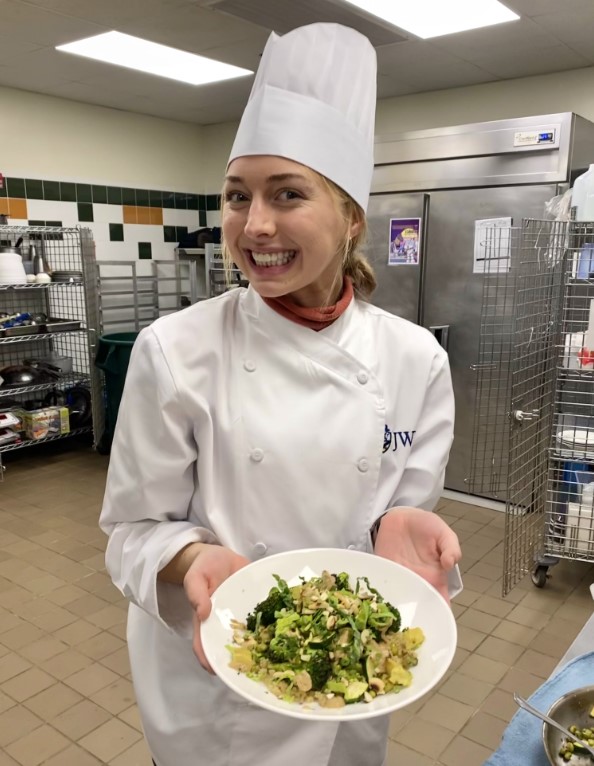Lexi Cole, 2023
Spring Break at JWU: Student Experiences

While most students escaped to beaches, mountains, and hometowns over spring break, I and three of my Friedman colleagues had the distinct pleasure of playing culinary school for a week. The four days at Johnson and Wales University’s College of Food Innovation and Technology were long and packed with hands-on work and inspiring conversations from beginning to end.
Hands-on work included a plated desserts class, culinary nutrition class, bread making class, fermentation lab, and contemporary cuisine class. Of these classes, the bread making class was my favorite. It was an intimately sized group, which enabled all of us Tufts students to help mix, knead, shape, score, and bake a bounty of beautiful bread. Cracked kamut batards, multigrain einkorn batons, walnut and rye boules, sourdough chocolate cherry rolls, and hand shaped bagels freckled the landscape of the bakery lab. Slicing into a warm loaf of einkorn sourdough, slathering it with butter, and sharing in the sheer pleasure of transformed grain with strangers and friends is an experience which I will never forget. Breaking bread together was a grounding experience that reminded me of food’s power to unite us. In a world that is seemingly divided over every small thing—even the utility and nutritional quality of bread—we must strive to curate more experiences such as these in which we can share in culture and pleasure together. If food cannot unite us, then what will?
Immersing myself in these classes and quite literally getting my hands dirty helped me develop a greater appreciation for the chefs that feed us, the students that are preparing to become chefs, and the chefs that train these future chefs. The passion and expertise with which they teach is bound to inspire future food system leaders to thoughtfully consider how food is grown, distributed, and prepared, so as to cultivate more informed and elevated plates.
While these classes taught me practical skills which I can use in my day-to-day life, the larger message that I took home is that food system transformation is not likely to happen by the singular efforts of one person, nor will it happen by some grandiose policy change. Food system transformation is going to happen when passionate, imperfect people put their heads together to reimagine how we can feed ourselves and our children differently than the existing paradigm. It became abundantly clear throughout the week that long-term, sustainable changes will only be made possible with thoughtful collaboration between chefs, dietitians, economists, physicians, innovators, farmers, policymakers, and many more stakeholders. The experience at JWU only strengthened my desire to continue in the field of culinary nutrition so that I can help drive systemic change to build a more sustainable and just food system. I look forward to the day when I can look back on this experience and point to these distinct moments as those that shaped me into the person I was always meant to become. Change will not happen with the wave of a magical wand, but rather one plate at a time.